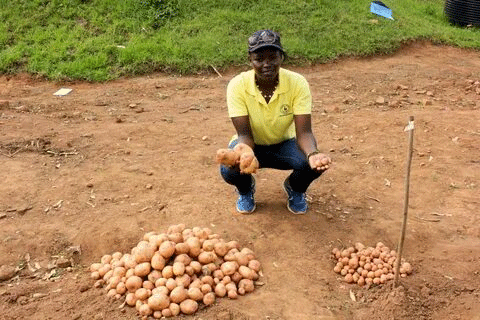As Kenya’s agricultural sector continues to evolve, the potato has emerged as a strategic crop under the government’s Bottom-Up Economic Transformation Agenda (BETA). Recognizing its potential to significantly contribute to the country’s food security and economy, the Agricultural Sector Transformation and Growth Strategy (ASTGS) has identified potatoes as one of 13 key value chains. The crop, second only to maize in Kenya, contributes around Sh50 billion annually to the economy. However, despite its importance, potato farming in regions like Nyandarua faces several challenges that need urgent attention.
The Importance of Potatoes in Kenya’s Agricultural Economy
Globally, potatoes are the third most important food crop after rice and wheat in terms of human consumption, according to the National Potato Council of Kenya (NPCK). In Kenya, potatoes are a staple food, second only to maize, and are a crucial component of food security. The crop supports smallholder farmers, providing both income and dietary diversity.
Despite its critical role, potato farming faces several productivity hurdles. Nyandarua County, one of the leading potato-producing regions, has struggled with low productivity. The key challenge highlighted by farmers is the limited availability of certified potato seeds. Currently, only 5% of potato seeds planted in the region are certified, with the remaining 95% produced informally. This reliance on uncertified seeds, coupled with poor agronomic practices, has kept yields low—averaging between 7 to 10 tonnes per hectare. According to the Ministry of Agriculture’s National Potato Strategy (2021-2025), proper management and technology could raise yields to as much as 30 to 40 tonnes per hectare.
The Kenya Sustainable Potato Initiative (KSPI)
In response to these challenges, the National Potato Council of Kenya (NPCK) has launched the Kenya Sustainable Potato Initiative (KSPI). The KSPI project aims to enhance potato production in four key counties: Nyandarua, Nandi, Laikipia, and Meru. By focusing on improving access to high-quality seeds, modern farming practices, and better market access, KSPI is expected to significantly boost productivity.
The initiative also emphasizes building a stronger and more efficient potato seed system. The NPCK, in collaboration with the International Potato Center (CIP) and AGRA (Alliance for a Green Revolution in Africa), is working to increase the availability of certified potato seeds. The current goal is to improve certified seed usage from 5% to 29% by the end of the year.
Addressing Post-Harvest Losses and Market Challenges
In addition to seed challenges, post-harvest losses remain a significant issue for potato farmers in Nyandarua and other counties. Poor storage facilities and a lack of infrastructure have resulted in considerable losses, which undermine farmers’ efforts to increase their incomes. For instance, Nyandarua County has a 500-tonne cold storage facility in Oljoroorok that remains underutilized due to low production levels. Improving the use of such facilities and expanding access to proper storage solutions is critical to reducing post-harvest losses.
The KSPI also aims to improve market access for potato farmers. AGRA Country Director John Macharia highlighted the importance of enforcing the 50 kg packaging regulation, which is intended to standardize potato marketing practices and protect farmers from unfair market practices. By working closely with local and national governments, as well as non-governmental organizations, KSPI aims to create a more favorable market environment for potato farmers.
The potato sector in Kenya holds significant potential to contribute to both food security and economic growth. However, realizing this potential requires addressing the challenges of certified seed access, poor agronomic practices, and post-harvest losses. The Kenya Sustainable Potato Initiative (KSPI) represents a critical step towards transforming potato farming in key counties like Nyandarua, Nandi, Laikipia, and Meru. By focusing on strengthening the seed system, enhancing market access, and promoting modern farming practices, Kenya can unlock the full potential of this vital crop.







